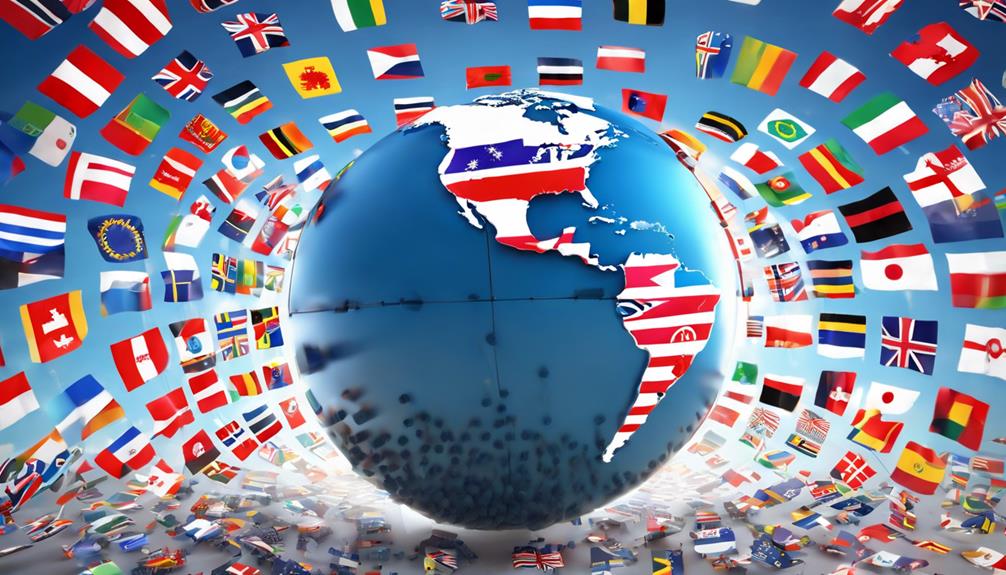
You're probably curious about who will dominate the global AI landscape. Currently, the United States and China hold the lead, thanks to Silicon Valley's tech giants and China's ambitious government-backed initiatives aiming for AI superiority by 2030. However, emerging players like India, which excels in AI-based healthcare and agriculture, and Brazil, with its advancements in logistics and urban planning, are also shaping up as significant competitors. Given the rapid evolution of AI technologies and global investment dynamics, these countries' strategic positions could shift quickly, hinting at an exciting future landscape that awaits your deeper exploration.
The Current AI Powerhouses

Dominating the global landscape, the United States and China are currently the leading powerhouses in artificial intelligence. You've probably noticed how these two giants are constantly head-to-head in technological advancements.
In the U.S., Silicon Valley serves as a hub for innovation, with companies like Google, Apple, and Microsoft pushing boundaries in machine learning and automation. They're not just enhancing user experiences but reshaping industries entirely.
Across the Pacific, China's ambitions in AI are no less formidable. The Chinese government has laid out plans to become the world leader in AI by 2030, heavily investing in both education and industry. Companies like Alibaba and Tencent match their American counterparts in both scale and sophistication, integrating AI into everything from e-commerce to city planning.
What sets these two apart isn't just the sheer scale of investment but their strategic approaches. The U.S. thrives on a competitive, entrepreneurial ecosystem, encouraging private sector innovation. Meanwhile, China's approach is more state-directed, with significant government backing.
As you're navigating this ever-evolving landscape, remember that the race isn't just about technology. It's also about how it's integrated into society and economy.
Emerging Nations in AI Development
While the U.S. and China continue to lead, several emerging nations are also making significant strides in AI development. You might be surprised to learn that countries like India, Brazil, and South Africa are rapidly advancing in the AI arena. These nations are leveraging their growing technical expertise and increasing investments in tech to carve out a niche in this competitive field.
In India, for example, there's a burgeoning ecosystem of AI startups and educational institutions focusing on AI research and applications. You'll find that Indian companies are excelling in AI-based healthcare solutions, agricultural technologies, and financial services.
Meanwhile, in Brazil, the government's support for AI initiatives has propelled the nation forward. Brazilian firms are making waves in AI-enhanced logistics and urban planning.
South Africa, on the other hand, is focusing on AI to solve local issues like wildlife conservation and disease diagnosis. The country's unique approach to integrating AI with mobile technologies is something you shouldn't overlook.
These nations aren't just following but are setting examples in specific sectors, showing that the race for AI dominance might just get more crowded. You'll see that their progress isn't only impressive but pivotal in shaping the global AI landscape.
Key Factors Influencing AI Leadership

Several key factors determine which nations lead in AI development, including investment, governmental support, and access to skilled talent.
You've got to consider the innovation ecosystems that thrive in environments rich with academic collaboration and industry partnerships. Imagine you're in a country where universities, startups, and established tech firms are constantly in sync, exchanging ideas and pushing the envelope. That's a fertile ground for AI advancements.
Then there's the digital infrastructure. You can't overlook the importance of high-speed internet, data storage, and computing power. Countries at the forefront ensure you have seamless access to these resources, enabling rapid testing and deployment of AI technologies.
Moreover, you'll see that cultural attitudes towards technology and innovation play a critical role. If you're in a society that embraces change and supports technological experimentation, you're likely in a place that fosters AI leadership.
Lastly, consider the public's readiness to adopt new technologies. Countries leading in AI don't just create; they integrate these innovations effectively into everyday life.
Government Policies and AI Investment
Now let's explore how government policies and AI investment shape a nation's leadership in artificial intelligence. As you dive into this realm, you'll find that the extent and direction of government involvement can significantly accelerate or hinder AI advancements.
Countries that prioritize AI in their policy agendas tend to foster environments ripe for innovation. They're not just throwing money at the problem; they're strategically investing in research, development, and infrastructure that supports the growth of AI technologies.
You'll see nations like the U.S. and China leading largely because their governments have laid down comprehensive AI strategies. These policies include funding for AI research at both university and industry levels, as well as subsidies for startups specializing in AI. More importantly, they've set up ethical guidelines and standards that direct the safe and fair use of AI.
On the flip side, you've also got countries lagging in AI because their policies haven't caught up. Without supportive legislation and investments, these regions struggle to attract talent and innovation, ultimately missing out on the AI boom.
It's clear that your government's stance on AI not only influences national capabilities but also determines how you compete on the global stage.
Future Predictions for AI Dominance

Looking ahead, it's crucial to consider which countries might dominate the AI landscape in the coming years. You've seen how the U.S. and China have been at the forefront, pouring billions into research and development. But don't overlook emerging players like India and the UK, whose innovative policies and substantial investments are setting them up as serious contenders.
You'll find that the race isn't just about who's investing the most money. It's also about who's crafting the smartest strategies and fostering the best talent. Countries that integrate AI with key industries like healthcare, automotive, and finance are positioning themselves for a more significant lead. They're not just developing AI; they're deploying it effectively.
Looking forward, you should keep an eye on collaborations between countries and private sectors. These alliances can amplify a country's capacity to innovate and apply AI solutions on a global scale.
Moreover, the ethical frameworks and regulations that countries adopt will play a crucial role in determining their leadership status in AI.
Frequently Asked Questions
How Does AI Impact Small Businesses Versus Large Corporations?
AI streamlines operations for both small and large businesses, but while large corporations leverage it for extensive data analysis and automation, small businesses use it more for improving customer interactions and cost efficiencies.
What Ethical Concerns Arise With Increased AI Leadership?
You'll face ethical concerns like privacy invasion, biased algorithms, and job displacement as AI leadership increases. It's crucial to address these issues to ensure fairness and protect individual rights in society.
Can AI Advancements Lead to Job Losses?
Yes, AI advancements can lead to job losses as automation replaces manual roles. You'll see shifts in employment where new skills are needed, demanding adaptation and retraining in various industries.
How Does AI Influence Everyday Consumer Experiences?
AI transforms your daily experiences by personalizing shopping, enhancing customer service through chatbots, and streamlining online interactions, making everything more tailored and efficient for you as you navigate various digital and physical environments.
What Are the Environmental Impacts of AI Development?
AI development significantly affects the environment, primarily through high energy consumption and electronic waste. You'll see increased carbon emissions from data centers and a surge in resource depletion from hardware manufacturing.
Conclusion
You've seen how the AI landscape is shaping up, with major players already dominating the scene and emerging nations catching up fast. Factors like government policies and investment are crucial in determining who leads.
As you look ahead, it's clear that the race for AI supremacy remains wide open. Stay tuned to see how innovation and strategic partnerships evolve, potentially reshaping global AI leadership.
The future isn't just about who leads, but how collaboratively we can advance in AI.






